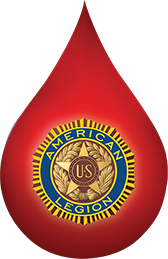
Together we can make a difference!
The use of the blood of one human being to save the life of another is one of the world’s greatest medical achievements. Thousands of people are alive today – happy children, young mothers, accident victims, the elderly – who have survived major operations because blood and blood components were available to combat many types of diseases and other medical problems.
While there will always be risks associated with blood transfusions, blood and blood products from healthy volunteer donors has proven to be much safer than blood from any other source. For this reason, your American Legion post should make every effort to recruit more healthy volunteer blood donors. In addition to making a significant
contribution to the health and welfare of your community, donors receive the satisfaction of knowing they have helped someone who needed blood or a blood product.
We urge our Posts, Units, and Squadrons to plan and host local blood drives, along with the State Wide Blood drive that is held annual every year.
Popular Blood Donation Centers in Florida
No Excuses!
Top 10 Common Excuses To Not Donate Blood
- I’m afraid of needles
Contrary to popular belief there is very little pain in the actual donation process. The feeling is no different than pinching your arm. - Other people must be giving enough blood
Only five percent of the eligible donor population actually bother to donate. New donors are needed to replace those who become ineligible due to medical reasons, and to keep pace with the rising need for blood each year. - My blood isn’t the right type
Every type is the right type. The rarest blood is the type that’s not available when you need it. All types must be on hand when they are needed. - You wouldn’t
The nurses on duty review each donor’s medical history before drawing the blood to protect the donor as well as the person who will receive the blood. Very few past illnesses exclude a person from donating. - I don’t have any blood to spare
If you are in generally good health, you have 10 to 12 pints in your body. You may safely donate one pint of blood every eight weeks. - I’m too old to donate
If you are in good health and 17 years or older, you are able to donate safely. There is no upper age limit to donating blood. - I don’t donate unless it’s an emergency
If people wait until a relative or friend needs blood, it could be too late to donate. It takes 12 to 18 hours to do the necessary typing and testing of the blood after donation. Blood has to be available before it is needed. - They throw away a lot of blood
The blood collected by Central Florida Blood Bank is generally delivered to a hospital for patient use, on the average, 48 hours after you have donated. - I can pay for any blood I need
If dollars could be transfused, there would be no need to donate. However, only blood can be transfused and only people can donate. All the money in the world is useless if no blood is available. - I don’t have the time to donate
Positively the poorest excuse ever invented. It only takes 30 minutes to give a pint of blood…the donation itself takes five to seven minutes on an average.
Donor Requirements
- Must be 17 years old (No upper age limit as long as healthy)
- Weigh at least 100 pounds
- Never had Hepatitis
- Be free of ALL cold and flu symptoms (or infection) on the day of donation
- Not have been pregnant within past 6 weeks (or pregnant now)
- No recent surgery
- No recent blood transfusion
- Cancer – 5 year wait and must be medication and symptom free
- Heart disease or heart medication – Must have a written doctor’s permit stating it is OK to donate (If you are on a blood thinner, you will not be able to donate)
- Diabetes – Diet controlled or taking oral medications, OK to donate. Insulin injections require a doctor’s permit
- Blood pressure medication – OK to donate but must wait 2 hours after taking or take medication after donating
- Must eat breakfast and/or lunch before donating. DO NOT donate on an empty stomach
- Aspirin – OK to donate, just let staff know how much and when taken
- Antibiotics – must wait five days from last dose before donating
- Must not have exposure to anyone with AIDS. Exception: nurse, doctor, paramedic, etc
- Malaria – Must wait 3 years and be medication and symptom free
- Travel to Malarial area – Must wait 6 months before donating

Patricia “Momma Chappy” Lucas
98 Gallons
January 2023
